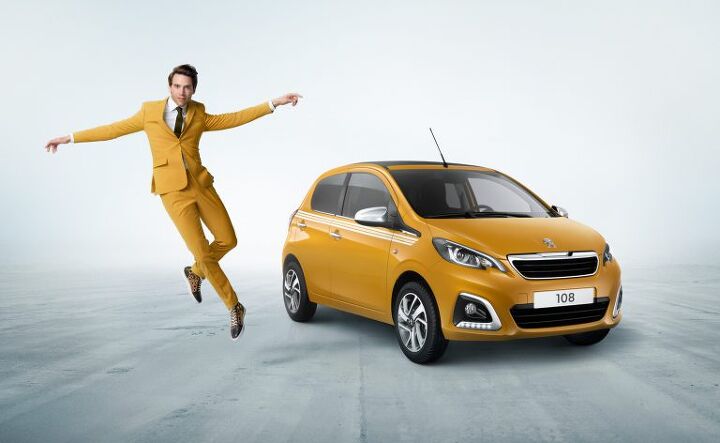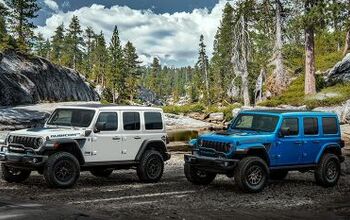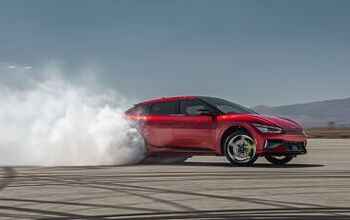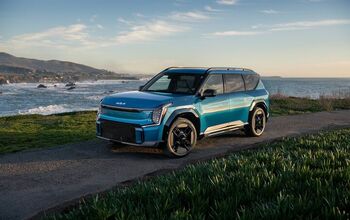France Thinks It Can Return to U.S. Auto Market On a Shoestring Budget

Since acquiring Opel and Vauxhall from General Motors, France’s PSA Group has dropped not-so-subtle hints that it wants back into the American market. Chief executive Carlos Tavares said the group is already engineering upcoming models to meet U.S. regulations. “That means that from three years down the road we’ll be able to push the button, if we decide to do so, in terms of product compliance vis-a-vis the U.S. regulations,” he explained during the Frankfurt Auto Show.
That means Citroën and Peugeot should have a few vehicles ready for export after 2020. However, selling them won’t be a piece of cake. PSA doesn’t have an established dealer network in the United States, nor does it have a corporate friend in the industry that might allow the company to borrow one.
Still, the European auto group doesn’t seem all that worried. Rather than worry about asking its automotive neighbors to loan it a cup of sweet dealership sugar, it noticed a lot of people prefer aspartame and acesulfame potassium. PSA plans to take a modern, tech-focused, affordable approach to the problem.
“We see the high cost of doing this business; we see the challenges that exist in profitability for dealers and OEMs,” PSA North America chief Larry Dominique told Automotive News last week. “We believe with the new tools, the new technology, the new customer expectations, there are leaner, more agile ways to do this.”
Establishing a dealer network of one’s own is ludicrously expensive. PSA doesn’t want to gamble on it, in the event America buyers aren’t responsive to what it’s offering. Tesla Motors faced a similar problem when it started selling cars — a problem it resolved through online sales and delivery centers. Chinese manufacturers are toying with similar concepts, pitching app-based sales as a way to circumvent dealerships entirely.
Dominique stressed that no official decision has been made at PSA. In fact, we don’t even know which brands it intends to send in America or what kind of timetable it’s working with. But he did say that, if the group decided to go with physical dealerships, the company would take great strides in implementing tech that would keep them profitable. “The world is changing around us from a standpoint of the way the people buy and engage in purchases,” said Dominique.
As a former TrueCar executive, it’s understandable that the CEO would stress the importance of a digital solution. TrueCar initially positioned itself as a way to ensure customers were getting the best deal on a vehicle. However, that model didn’t turn out to be entirely profitable and the company gradually shifted its emphasis toward dealerships (which started to really take off around the time of Dominique’s departure).
Engaging consumers while keeping dealerships happy is an utterly brutal balancing act. But TrueCar provides a valuable lesson — digital car sales have continued growing despite the hardships. A majority of industry analysts are comfortable suggesting roughly 10 percent of all U.S. vehicle transactions could occur online by 2019.
Meanwhile, dealership expenses (as a percentage of total sales) rose to 98.7 percent last year, according to National Automobile Dealers Association data. Average losses on new vehicles ballooned to $421 per car, against $22 per car in 2015. This isn’t abnormal; stores sometimes lose money when the market sucks, only to come back with record-setting profits a few years later. But dealerships losing money helps fan the flames that tech will come in and flip the table — ushering in an entirely new era for the auto industry.
“We need to find a way to reduce our fixed costs,” Dominique said. “We want people to make a profit selling a new car.”
We would urge everyone to remain cautious around the presumption that a digital solution is the only answer to the changing market. Whether you love or hate them, dealerships aren’t going to vanish overnight. But there could be an opportunity here worth taking advantage of here. Digital sales could be a stepping stone until PSA feels safe in setting up brick-and-mortar storefronts in America.
“One of the things we are studying right now is, how can we best balance this — make a better customer experience, more seamless, more online, but also provide the right access to the services and the physical elements when you need them?” Dominique added.
Likewise, it would be foolish for any automaker to ignore tech-based solutions. Not just because it could make them money, but because practically everyone else is already trying their hand. In addition to the proposed digital sales, PSA has already launched an all-in-one transportation application called Free2Move. The app allows customers to hail a ride, pay for mass transit, book a car, and more via a single platform. It’s clever and just the sort of thing other big automakers are trying to create to keep customers engaged with their platforms (and from straying to the competition). PSA intends to launch a similar app for the American market eventually.
As for the cars, PSA hasn’t said much. We know it wants to minimize set-up costs wherever possible, swapping to digital solutions without alienating customers. However, we haven’t really heard anything about tangible product. That should change by winter.
“At the end of this year, we are going to make things a lot clearer relative to [product] timelines,” Dominique said. “By early [2019], we are going to be working more toward the next phase of selling retail, not just planning.”
[Image: Groupe PSA]

A staunch consumer advocate tracking industry trends and regulation. Before joining TTAC, Matt spent a decade working for marketing and research firms based in NYC. Clients included several of the world’s largest automakers, global tire brands, and aftermarket part suppliers. Dissatisfied with the corporate world and resentful of having to wear suits everyday, he pivoted to writing about cars. Since then, that man has become an ardent supporter of the right-to-repair movement, been interviewed on the auto industry by national radio broadcasts, driven more rental cars than anyone ever should, participated in amateur rallying events, and received the requisite minimum training as sanctioned by the SCCA. Handy with a wrench, Matt grew up surrounded by Detroit auto workers and managed to get a pizza delivery job before he was legally eligible. He later found himself driving box trucks through Manhattan, guaranteeing future sympathy for actual truckers. He continues to conduct research pertaining to the automotive sector as an independent contractor and has since moved back to his native Michigan, closer to where the cars are born. A contrarian, Matt claims to prefer understeer — stating that front and all-wheel drive vehicles cater best to his driving style.
More by Matt Posky
Latest Car Reviews
Read moreLatest Product Reviews
Read moreRecent Comments
- V8fairy Not scared, but I would be reluctant to put my trust in it. The technology is just not quite there yet
- V8fairy Headlights that switch on/off with the ignition - similar to the requirement that Sweden has- lights must run any time the car is on.Definitely knobs and buttons, touchscreens should only be for navigation and phone mirroring and configuration of non essential items like stereo balance/ fade etc>Bagpipes for following too close.A following distance warning system - I'd be happy to see made mandatory. And bagpipes would be a good choice for this, so hard to put up with!ABS probably should be a mandatory requirementI personally would like to have blind spot monitoring, although should absolutely NOT be mandatory. Is there a blind spot monitoring kit that could be rerofitted to a 1980 Cadillac?
- IBx1 A manual transmission
- Bd2 All these inane posts (often referencing Hyundai, Kia) the past week are by "Anal" who has been using my handle, so just ignore them...
- 3-On-The-Tree I was disappointed that when I bought my 2002 Suzuki GSX1300R that the Europeans put a mandatory speed limiter on it from 197mph down to 186mph for the 2002 year U.S models.


































Comments
Join the conversation
With a picture like that? Lol. Oh boy, I can only imagine what the average American would have to say about that one.
When I was in France a decade or so ago the guy who was my business host said that even French don't like French cars. And sure enough he went out and bought a VW.